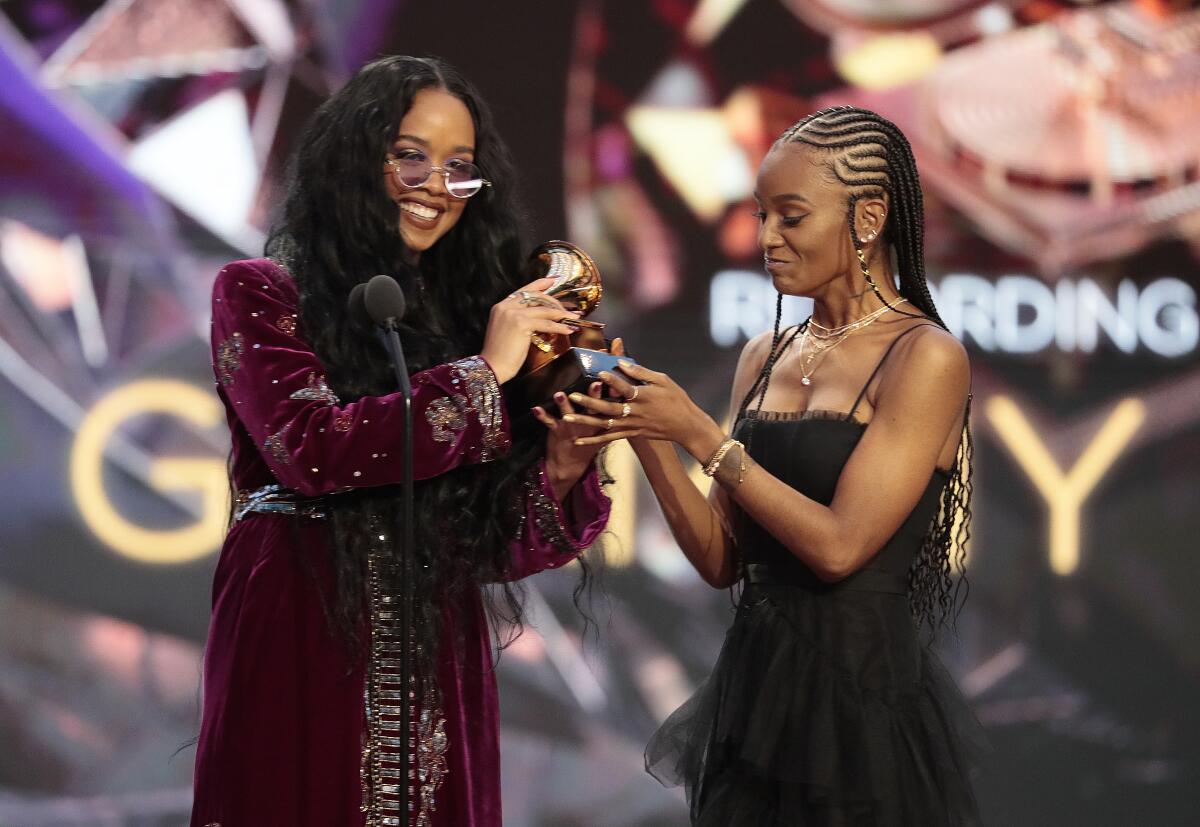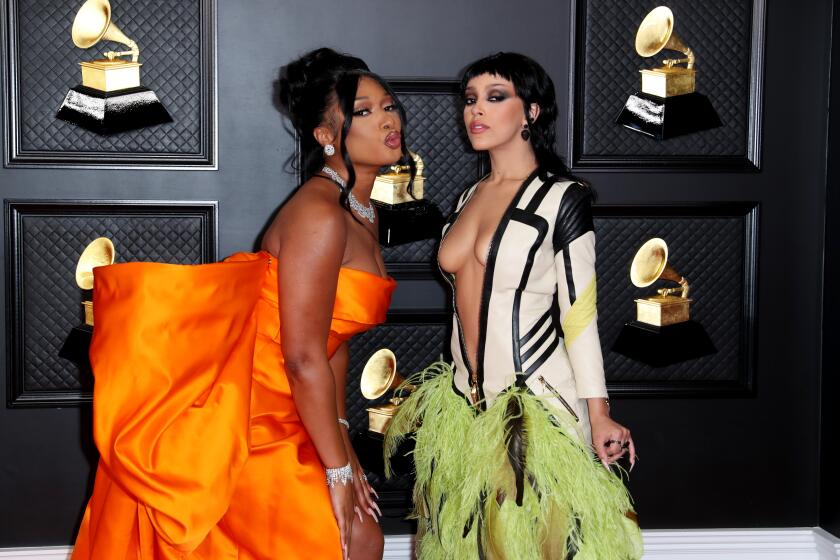For H.E.R., a career-making 12 hours: A Grammy win followed by an Oscar nomination

- Share via
Few musicians have had a better 12 hours at awards shows than Gabi Wilson, the 23-year-old R&B singer-songwriter who performs as H.E.R.
At Sunday night’s 63rd Grammy Awards, she won song of the year for “I Can’t Breathe,” her protest song inspired by the uprisings against police violence in the summer of 2020.
Early the next morning, she learned that she’d earned an Oscar nomination for original song for “Fight for You,” from the Black Panther-era drama “Judas and the Black Messiah,” which is also up for best picture.
“It was such a surprise,” said the singer, speaking by phone from L.A. just a few hours after receiving her Oscar nod. “You have no idea.”
With a new executive producer at the helm, Sunday’s show was dominated by young artists, to the near exclusion of music’s elders.
“I Can’t Breathe” never cracked the Billboard Hot 100, but Grammy voters chose it in a surprise over the better-known songs of her category peers. (H.E.R. also won a Grammy for R&B song.)
“Being in the audience at the Grammys, sitting with Beyoncé, Billie Eilish, Taylor Swift and all these amazing artists, I didn’t imagine my song would win,” she said. “I didn’t realize the impact the song had. A lot of people came to me there and said they were touched by it, that they reflected and marched to it, which means more to me than anything. But yeah, it was such a surprise. I mean, Beyoncé was right there!”
H.E.R. — short for “Having Everything Revealed” — is no Grammy novice. A daughter of Black and Filipino parents (her soul musician father had Prince and classic R&B playing constantly), she first emerged as a Bay Area piano prodigy as a child. A close student of Lauryn Hill, the last Black woman to win album of the year, H.E.R. won Grammys for R&B performance and R&B album in 2019.

“I Can’t Breathe” took its title from an activist slogan adopted after the death of Eric Garner, who was killed by an NYPD officer using a banned chokehold. The song — a slow, deeply pained yet insistent ballad — was one of several 2020 singles, like Lil Baby’s “The Bigger Picture,” that spoke directly to the protests over the deaths of George Floyd, Breonna Taylor and others. Its lyrics are timely and introspective. “What is a gun to a man that surrenders?” she sings. “What’s it gonna take for someone to defend her?”
It ends with a barbed spoken word segment meant to be uncomfortable for white listeners, even those who had been nodding in agreement just before: “You think your so-called ‘black friend’ validates your wokeness and erases your racism,” she asks.
H.E.R. said she intended for the song (co-written with Tiara Thomas and Dernst “D’Mile” Emile II) to be a marker in time, a document for future listeners to remember this moment of fear and potential for Black activism.
“It’s such an important part of history, and I’d like people to be reminded of where we came from but also that we’re heading in a better direction,” she said, citing Marvin Gaye and Nina Simone as guiding lights. “A song like this comes from a place of hope that things will change but also acknowledge the people who are not with us. I hope we can look back and say, ‘Thank God we’re not in this place anymore.’ I don’t want this song to be so relevant years from now. I want it to be a reminder of how much we’ve changed.”

H.E.R. is a little wary of her writing being siloed as the industry’s go-to resistance music. “There are so many pieces of me I’ve had yet to unleash. But I always want to be an advocate for changing things instead of just bashing,” she added, about the Recording Academy’s slow march toward inclusivity and diversity. “It’s important for Black women to be heard because there is an inequity there. With the [academy’s] Black Music Collective, we’re making changes in that infrastructure. I’m not bitter or boycotting, I’m going to be a part of the change.”
Her Oscar nomination for “Judas,” just hours old when she spoke about it, came from a similarly spirited single — but one written to inhabit a tense moment in the 1960s.
“Fight for You,” also written and produced with Emile and Thomas, evokes the conflicting motivations of Black Panther leader Fred Hampton (played by Daniel Kaluuya) and an FBI informant (LaKeith Stanfield) out to infiltrate his movement. Was solidarity with a cause or personal survival more important? To whom does one owe loyalty — your community or your aspirations?
“It was a really fun task because while I’m speaking as a 23-year-old in 2021, I’m also looking at this storyline and their internal battles,” she said. “Everyone was fighting for something then, and [Hampton] was only 21. That got me thinking about how it relates to now.”
Oscars 2021: Why was LaKeith Stanfield nominated as a supporting, rather than lead, actor? Ask the acting branch.
H.E.R. may have had a warm reception at the Grammys and Oscars (where her song is competing against selections from films “One Night in Miami,” The Life Ahead,” “The Trial of the Chicago 7” and “Eurovision Song Contest: The Story of Fire Saga”), but last month, she also took her cause to the biggest stage that American entertainment can offer.
H.E.R. opened the Super Bowl in February this year with a performance of “America the Beautiful,” one she arranged for solo electric guitar and voice.
“Millions of young Black women saw it and can now say, ‘I can do that,’” she said. “Even though I’ve seen a lot of ugly things in this country, it’s beautiful to see a young Black woman come out strong and play her guitar, despite everything going on.”
More to Read
The biggest entertainment stories
Get our big stories about Hollywood, film, television, music, arts, culture and more right in your inbox as soon as they publish.
You may occasionally receive promotional content from the Los Angeles Times.












